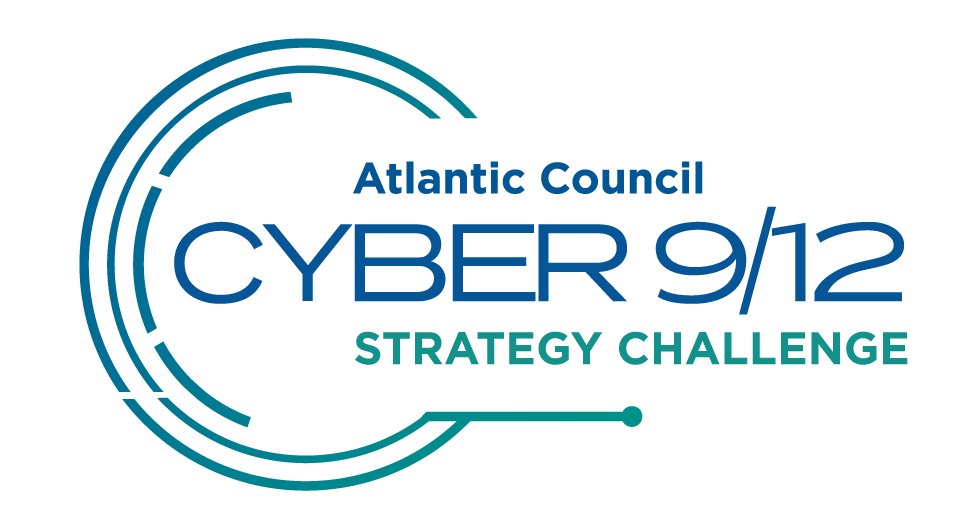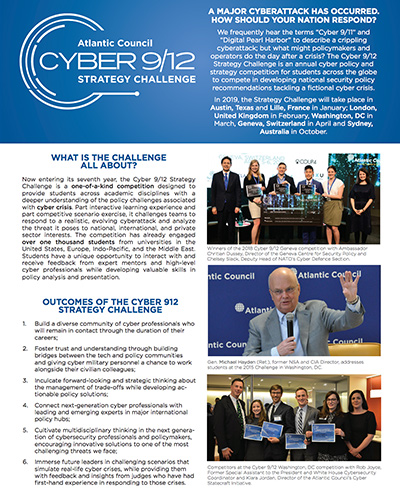
competition frequently asked questions |
What is the Cyber 9/12 Strategy Challenge?
The Cyber 9/12 Strategy Challenge is the only student competition devoted to high-level policy recommendations for day-after responses to a major cyber incident.
The Strategy Challenge is designed to offer students across a wide range of academic disciplines a better understanding of the policy challenges associated with cyber crisis and conflict. Part interactive learning experience and part competitive scenario exercise, the Strategy Challenge gives students interested in cyber conflict policy an opportunity to interact with expert mentors, judges, and cyber professionals, while developing valuable skills in policy analysis and presentation. Student teams will be challenged to respond to an evolving scenario involving a major cyber-attack and analyze the threats that it poses to state, military, and private sector interests. Teams will be judged based on the quality of their policy responses, their decision-making processes, and their oral presentations to a panel of judges. Along the way, teams will work with coaches from their home institutions to develop their policy skills; feedback from expert panels of judges will ensure that all participants have an opportunity to improve their skills; and the collaborative environment will provide networking opportunities during the competition.
By participating in the competition, students have a unique opportunity to interact with expert mentors and high-level cyber professionals, while developing valuable skills in policy analysis and presentation. The competition has already engaged over one thousand students from universities in the United States, Europe, Middle East and Indo-Pacific.
Who can compete?
Students currently enrolled in an undergraduate, graduate, doctoral, professional, or law program, including students in military academies, on the date of the registration deadline are eligible to compete. We also welcome competitors who have participated in the Strategy Challenge in previous years. There is no explicit major, coursework, or prior experience in cyber conflict necessary to compete, but successful applicants will be able to demonstrate a strong link between cyber conflict policy and their current academic interest.
Students with an interest in cyber conflict policy from around the world are invited to apply. However, the Cyber 9/12 Strategy Challenge cannot guarantee any funds to support team travel and accommodation expenses. Applicants are encouraged to inquire about funding from their home institutions.
How do I register?
We will announce the opening of registration at the Cyber 9/12 webpage, as well as the Cyber Statecraft Initiative’s twitter. To be considered for the competition, interested teams must submit all registration materials, including all team information, by the registration deadline. After all registration materials have been received, teams selected to compete will receive invitations and competition materials. Teams registering late may be considered at the discretion of the Competition Director, space permitting.
Are there any requirements on team composition?
Each team must include four students. Teams that register less than four competitors may be considered at the discretion of the Competition Director, space permitting. There are no requirements for team composition based on the majors or education level of team members.
Teams with competitors with little or no relevant professional experience related to cybersecurity, policy or strategy are eligible to compete in the Student Track.
Teams with competitors that have substantial relevant professional experience related to cybersecurity, policy and strategy are eligible to compete in the Professional Track.
Each team must also recruit a faculty member to act as their team coach and mentor. While coaches are not required to take part in the competition event, their participation is necessary to ensure that all teams have access to assistance in crafting their responses.
Can all registered teams take part in the competition?
The Atlantic Council reserves the right to limit the number of teams competing in the Cyber 9/12 Strategy Challenge. If the amount of teams registering for the competition exceeds the Council’s logistical capacity, written policy briefs will be analyzed by a review board and utilized to determine which teams qualify for the event. Should the review process become necessary, all registered teams will be notified as soon as possible.
How is the competition structured?
One month before the competition, all registered teams receive Intelligence Report I, setting the stage for the simulated cyberattack. The teams are given approximately two weeks to prepare their written policy briefs.
The two days of the competition are divided into qualifying, semifinal, and final rounds. All teams submitting a written policy brief are entitled to participate in the qualifying round on the first competition day. Teams advancing to the semifinal round will be announced at an evening reception, where they receive Intelligence Report II, further adjusting the simulated scenario.
In the morning of the second day of the competition, semifinalist teams present their modified policy recommendations based on the evolved scenario. Teams advancing to the final round receive Intelligence Report III and very limited time to adjust their recommendations. In the afternoon of the second day, finalist teams present on a stage to a panel of celebrity judges. The competition concludes with an awards reception.
What is the format of the competition?
The Cyber 9/12 Strategy Challenge consists of a fictional simulated cyberattack scenario that evolves over the course of the competition, prompting teams to modify their policy priorities and recommendations as part of successive oral presentations. All teams will submit written policy briefs in advance of the competition and compete in the qualifying competition round on day one. The judges’ score of the qualifying round oral presentations will be combined with the team score from the more detailed written policy brief submitted in advance of the competition.
During the qualifying round on day one, teams will deliver a ten minute oral presentation based on the written policy briefs prepared before the competition, followed by ten minutes to answer direct questions from a panel of judges. Judges will then provide feedback and score the students based on their performances. At the qualifying awards reception, advancing teams will be given an intelligence report that further alters the original scenario.
During the semi-final round, advancing teams will deliver a ten minute oral presentation based on a new intelligence report received at the conclusion of day one, followed by ten minutes to answer direct questions from a panel of judges. Teams are given limited time to respond to the altered scenario, testing their ability to analyze information as a team and synthesize a response with limited preparation.
After the teams advancing to the final round are announced, the finalist teams will receive the third and final intelligence report, detailing further changes to the scenario. The teams are provided with a very short amount of time to use the new information to revise their policy responses. The finalists will deliver a ten minute oral presentation, followed by ten minutes to answer direct questions from a panel of judges.
The competition is comprised of two tracks–Student and Professional, which accounts for the experience and skill sets of teams. The Professional Track will be comprised of teams whose members have substantial relevant professional experience and the Student Track will be comprised of teams whose members are undergraduate students and have less professional experience. Competitors in the two separate tracks only compete against other teams in their track. One Professional and one Student team will emerge as the winner of their track.
What tasks are part of the competition?
The competition will focus on a single fictional simulated cyberattack scenario described through several intelligence reports. The competition encompasses tasks, both written and oral, that challenge students to respond to the political, economic, and security problems created by the evolving cyberattack scenario. Teams will be provided with an intelligence report that sets the scene for the fictional cyberattack prior to the first competition day.
- Written Cyber Policy Brief
Teams will write a policy brief exploring the challenges faced by state, military, and industry actors related to the cyber incident described in the scenario materials. The brief must also recommend appropriate actions and policy responses for the actors involved. The brief is limited to one double-sided page. - Oral Cyber Policy Brief
Teams will be given ten minutes to present their policy recommendations, followed by ten minutes to answer direct questions from a panel of judges. More detailed instructions will be distributed to the teams selected for the competition. - Decision Document
Teams will also be required to submit a “decision document” accompanying their oral presentation at the beginning of the semi-final competition round. The “decision document” will be one single-sided page in length, outlining the team’s decision-making process and recommendations.
Is there a required format for the oral briefing?
There is no requirement for the structure or format of presentations. Presentations are limited to ten minutes. Each team must decide how to best conduct their briefing.
Can presentation aids be used for the oral presentations?
NO presentation aids (e.g., PowerPoint, props, and posters) are permitted. Teams will not be allowed to use electronic devices such as cellular phones and computers during the competition events, when teams are presenting or answering judge questions. However, teams may use electronic devices such as cellular phones and computers during the breaks between rounds. Paper notes are highly encouraged at all times during the competition.
Can teams use charts in the written brief?
Graphs, images, tables, and other graphics are permitted, but count towards the one double-sided page limit. Submissions that exceed the maximum page will be penalized.
What sources can I use to prepare my responses? How should these sources be cited?
Sources and citations are not required for the written policy response. If used, they will count toward the total page count.
What prizes will be awarded?
There will be awards for the top performing teams based on score, as well as team awards for best written brief, best oral presentation, best teamwork, most creative policy response alternative and most engaged.
What should I bring to the competition?
There are no restrictions on what teams may bring with them to the venue. However, during the competition rounds, no electronic assistance will be permitted. Teams are encouraged to use written or printed notes to help them during their presentations.
Is there a recommended hotel to stay in for the competition? Is there a conference rate available?
Unfortunately, we do not have conference rates available. However, we will send you information on the location of the competition prior to the competition, including information on hotels and transportation near the venue.
Where do I find more information on the competition?
For more information, please visit the Atlantic Council website, the Cyber Statecraft Initiative Twitter, or contact Ms. Safa Shahwan, Assistant Director, Cyber Statecraft Initiative at the Atlantic Council, at SShahwan@AtlanticCouncil.org or +1-202-864-2861.

